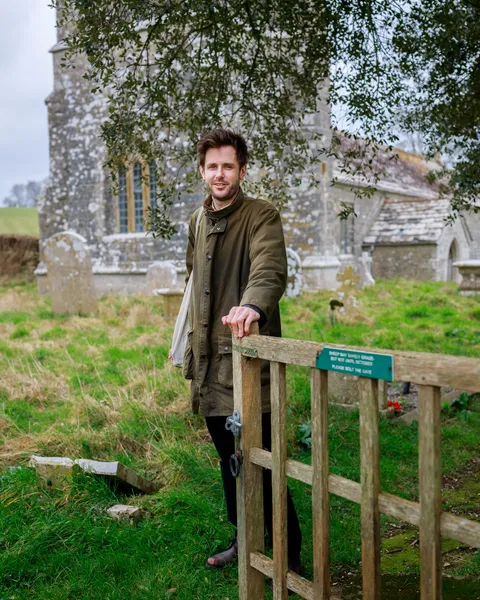.svg)
We advance British pilgrimage as a form of cultural heritage that promotes holistic wellbeing, accessible to all

‘Holistic wellbeing’ includes physical, mental, emotional, social, community, environmental and spiritual health.

.webp)
.svg)
The British Pilgrimage Trust is dedicated to modernising the ancient practice of pilgrimage
We seek to connect people of all faiths and none to Britain’s rich cultural heritage and natural beauty.
From cathedrals and ancient trees to river sources, holy wells and standing stones, we invite everyone to embark on a personal journey that promotes holistic well-being through walking in the footsteps of our land's ancestors.
Pilgrimage heals our mind, body and soul and connects us to places, communities, history and landscapes, enriching our lives through the feelings they evoke.
We believe in making pilgrimages inclusive, allowing people to bring their own beliefs and make their journey for purely personal reasons.
Since our charity was founded in 2014, we have seen and heard how this ancient rite offers powerful solutions to modern life challenges by fostering personal growth and mental wellness through a deeper connection to nature and heritage.
Your support helps us continue our work.
.svg)
We offer a unique network of hundreds of pilgrim routes and places of pilgrimage.
Our achievements so far in numbers
When we formed our charity in 2014, few people were talking about pilgrimage in Britain.
By guiding pilgrimages and building Britain's most comprehensive collection of routes and places, we have seen and heard how this ancient practice offers powerful solutions to challenges in modern life.
We have created a free and comprehensive collection of more than 250 routes and places in Britain, with free digital maps and GPS resources.
We have established over fifty low-cost overnight Sanctuaries in a network of communities along routes
Our guided events all over Britain have introduced more than thousands of people to pilgrimage. We have partnered to make pilgrimage accessible to under-served communities.
.svg)
Meet the team behind your journeys
.jpg)
Dr. Guy Hayward
Director & Co-Founder
Guy co-founded the British Pilgrimage Trust, after completing a PhD at Cambridge on how singing forms community. Guy also runs the website choralevensong.org and is one half of musical comedy duo Bounder & Cad.

Dawn Champion
Head of Community Engagement
Dawn Champion is a historian, naturalist and pilgrim whose rural upbringing has given her a deep love of the land. After a career with English Heritage and the Wildlife Trusts, she now works for the British Pilgrimage Trust, reviving a culture of pilgrimage and helping more people discover the benefits of this ancient tradition with modern meaning. Dawn's voluntary work supports wildlife conservation and helping children to connect to the magic of nature.

Heather Elsley
Head of Finance and Fundraising
Heather joined the team after a thirty-five year career in the Civil Service. She is delighted to be able to combine her skills in Programme Management and Financial & Management Accounting with her deep love of walking, history and myths. She also volunteers for charities involved in Dementia research and support.

Simon Guild
Chair of Trustees
Simon has 15 years’ experience as a non-executive director helping founders build online businesses. These include Babbel, a language learning business, 8Fit, an online fitness company, Spreadshirt, which customises apparel, Picfair, a photographer platform & Get Licensed, a security training business. He has been a trustee of Blood Cancer UK for 8 years and a fellow of the RSA for 20 years and was previously CEO of MTV Networks Europe. He is currently engaged in a pilgrimage connecting the greatest cathedrals of Britain.
.jpg)
Abigail Rowe
Trustee
Abigail works professionally with three charities, primarily in a fundraising capacity. She is currently walking the bounds of England, in a bid to keep learning more about our amazing heritage.
.jpg)
William de Winton
Trustee
William is a retired member of Lansdowne Partners and a former Managing Director of Morgan Stanley. He spent much of his career following the financial sector. He sits on a number of charity boards and is a founding Trustee of Unlocking Potential. He is also a founding Trustee of the SpringBoard Bursary Foundation which is the UK’s largest boarding school bursary charity.

Alice Lankester
Trustee
Alice has spent the past three decades in marketing and product roles in Silicon Valley and London, working in leadership roles for technology startups and early growth stage companies. Alice led marketing at one of Europe's leading venture capital firms, Balderton Capital. She has been a Co-founder and C-team member of startups funded by Kleiner Perkins, NEA, and Sequoia Capital, and CMO at business and consumer startups.

Daze Aghaji
Trustee
Daze Aghaji is a climate justice activist, strategist, and consultant with experience driving systemic change. She is a founding member of Extinction Rebellion Youth, where she played a key role in the organising major actions like the 2019 London occupation. Daze successfully led a judicial review that forced the UK government to release its Net Zero Strategy ahead of COP26. Formerly Creative Director at Earthrise Studio, she helped build a social media following of over three million people to raise awareness of the climate crisis. As co-founder of Hard Art, Daze combines creativity and activism to inspire cultural disruption for climate action.

Sarah Sands
Trustee
Sarah Sands is a former newspaper editor of the Sunday Telegraph and The Evening Standard and a former editor of BBC Radio 4‘s Today programme. She is a trustee of the Science Museum Group, John Innes Centre and Bletchley Park Trust and a non executive director of Channel 4. She is a former deputy chair of the British Council and a former trustee of Index on Censorship. She is also a former chair of the G7 gender equality advisory council. She lives mostly in Norfolk and has plotted a merchant and pilgrim route from King’s Lynn to Ely Cathedral in memory of her brother, Kit. Her books include The Interior Silence, The Hedgehog Diaries and an audio book Constellations and Consolations.
Our Patrons

Luke Sherlock
Author & Bookshop Owner
Luke Sherlock is an author and the owner of 'Sherlock & Pages', a bookshop specialising in nature, landscape, history and heritage. Before this he worked in various sustainability roles for well over a decade and is a passionate environmentalist. He goes by @englishpilgrim on instagram where he regularly documents his journeys.

Alice Loxton
History Broadcaster & Author
Alice Loxton is a history broadcaster and author with over three million followers on social media (@history_alice), where she educates on British heritage and history. Her second book, Eighteen: A History of Britain in 18 Young Lives, was a Sunday Times bestseller and Blackwell’s Book of the Year.

Roger Tempest
Rewilder + Landowner
Broughton Sanctuary, now the UK’s leading Retreat Centre, has been Roger Tempest’s family home for 32 generations and over 900 years of history resting on his shoulders he has only one mission in life: to secure its future. Anyone who thinks living in a historic home is glamorous is sorely mistaken – Roger grew up with no heating, damp rooms and run-down buildings. But even at a young age, he knew he wanted to save it.
In the late 1980s, aged 25, Roger unexpectedly took on the role of custodian, ending his blossoming career on Fleet Street. (He’d heard Eddy Shah talking about the launch of the Today newspaper and inspired by his desire to challenge the status quo had asked for a job, ending up as Assistant to the Managing Editor.) So instead of working long term to make a success of the paper, Roger found himself working to make a success of the Estate. Never one to follow the norm, he decided against opening to the general public and instead created a plan that blended conservation, enterprise and innovation to regenerate not just Broughton Hall but the community around it.
His appointments range from executive chairman of a national infrastructure development project in Libya, on a board of an international homeless charity to being a joint founder of Wyrd Experience, a company which develops consciousness technology, to running a group of companies within Rural Concepts Group specialising in rural regeneration.

Tom Holland
Historian + Broadcaster
Tom Holland is an award-winning historian, author, broadcaster and co-presenter of the top 10 podcast, The Rest is History. He is the author of Millennium: The End of the World and the Forging of Christendom, a panoramic account of the two centuries on either side of the apocalyptic year 1000, Dominion, and the biography of Æthelstan, the first King of England and of Æthelflæd, England’s Forgotten Founder. Tom is the presenter of BBC Radio 4’s Making History and has written and presented a number of TV documentaries, for the BBC and Channel 4, on subjects ranging from ISIS to dinosaurs.
.jpg)
Janet Astor
Psychotherapist + Mythologist
A life-long enthusiast of myths and ancient history, as well as a psychotherapist, the Duchess of Richmond is helping the BPT to fundraise and network in order to establish the Old Way route which passes near the Goodwood Estate, Chichester.

Emma Bridgewater
Ceramicist + Rural Campaigner
Emma runs the British ceramics manufacturer 'Emma Bridgewater', based in Stoke on Trent. In 2016, she was made President of the Campaign to Protect Rural England, a charity that was formed in 1926 to limit urban sprawl and ribbon development. She is also a keen supporter of church heritage conservation.

Dr. Rupert Sheldrake
Biologist + Scientist of Spiritual Practices
Rupert is a biologist and author of many popular books on modern science. He is known for asking the questions other scientists prefer to ignore, such as in his book The Science Delusion. Rupert’s latest pilgrimage experiments have focussed on the potential role of pilgrimage in the relationship between god-parents and god-children.
.jpeg)
Robin Bridgeman
Life Peer
Robin is one of 90 elected hereditary Peers in the House of Lords, and a keen and regular pilgrim to Lourdes.
.jpg)
Sir Simon Jenkins
Author + Newspaper Columnist + Editor
Simon served as editor of the Evening Standard from 1976 to 1978 and of The Times from 1990 to 1992, and chaired the National Trust from 2008 to 2014. He currently writes columns for both The Guardian and Evening Standard, and sits on the committee of the Churches Conservation Trust and English Churches and Cathedrals Sustainability Commission Review.
.webp)
.svg)
.svg)




.svg)



